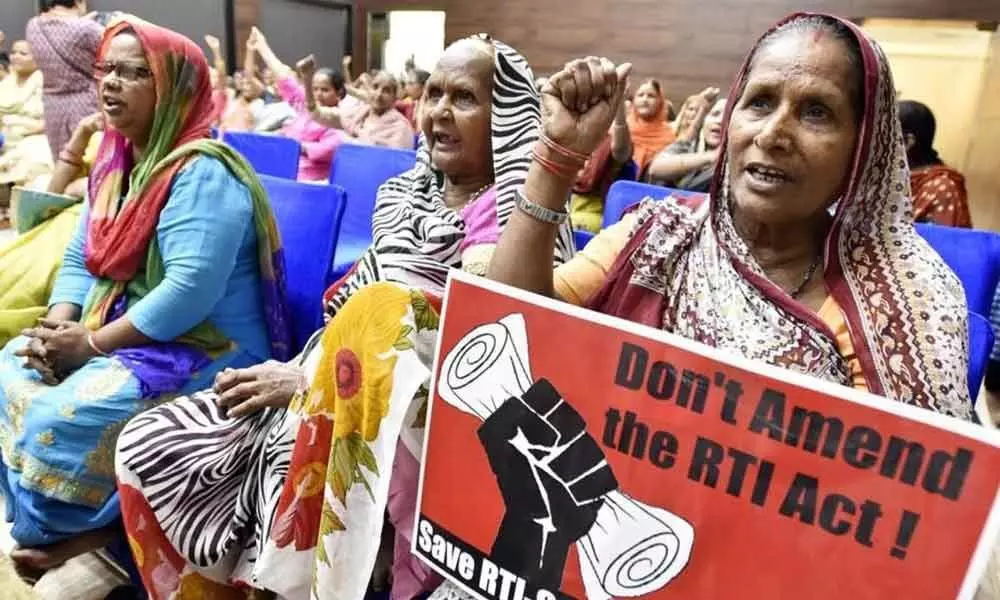RTI Rules 2019 damage ICs badly

It was not just cutting the independence but complete subordination of institution of Information Commission, with chief subordinate as head, to whom the other Commissioners are made subordinate servants.
It was not just cutting the independence but complete subordination of institution of Information Commission, with chief subordinate as head, to whom the other Commissioners are made subordinate servants.
With the suspense and mystery on the real impact on RTI ended, the damage was revealed. It is more than expected. Called "The Right to Information (term of office, salaries, allowances and other terms and conditions of service of Chief Information Commissioner, Information Commissioners in the Central Information Commission, State Chief Information Commissioner and State Information Commissioners in the State Information Commission) Rules, 2019 (shortly referred as RTI Rules 2019)" has facilitated the Centre to take over the power from State governments.
The first impact is: Chief ICs and the SICs have been equated with serving civil servants, who are placed in the same pay grade, i.e., the Chief IC in CIC is equated with a Cabinet Secretary while all other ICs, SCICs and ICs have been equated with officers of the same grade in the service of the Central or State government respectively.
Secondly: Information Commissioners get less salary than Chief Information Commissioner, which creates hierarchy which was deliberately avoided in original Act. Information Commissioners become subordinates to the Chief, who is made subordinate to the government.
Rule 22 gives the Central government the discretionary power to relax any of these Rules about any class or category of persons in future.
Rule 21 gives absolute power to the Central government to decide on any other allowances or service conditions not specifically covered by the 2019 Rules and its decision will be binding. Rule 23 makes the Central government the final arbiter about the interpretation of these Rules.
There are several legal issues: The Amendment Act 2019 and Rules 2019 destroy the independence accorded to the Information Commission within the whole scheme of Act of 2005, which cannot be taken away by amending couple of sections.
The Centre's control over the State Information Commissions is against federal character of the Constitution, which is basic structure, to amend which the Parliament has no power.
The Act and Rules of 2019 have the effect of indoctrinating complete subordination into the institution of the information commission, making the RTI not workable.
While RTI Amendment Act 2019, destroyed the independence, the Rules completed the job by indoctrinating the subordination. Between the lines of these rules one finds how the Chief Information Commissioner has been degraded from his statute-guaranteed-status equal to Chief Election Commissioner which is pari materia to judge of Supreme Court into the lower level of Secretary that reminds him always that he will be working as a bureaucrat under their superiors.
Most of the Chief Information Commissioners were practically subservient though the Act wanted them to act independently. Now subordination and loyalty as most considered qualifications for appointment as ICs is now legalised.
That is the real jolt to the independence of the Commissioners which was accorded after much deliberations, consultations, hearings and approval by the Parliamentary Standing Committee (PSC).
After making the Chief IC the subordinate to PMO and DoPT, the Centre destroyed independence of the individual Commissioners also by making them subordinate to the Chief Information Commissioners, which was not envisaged by the original Right to Information Act, 2005.
The Chief was first among equals earlier under the original scheme of RTI Act but now he is the super boss. It was a clever way to weaken the Commission and the Commissioners.
The Rules 2019 reduced the salary of the Information Commission from Rs 2.50 lakh to Rs 2.25 lakh, to make it clear that Chief will be of Secretary rank while the Commissioners would serve below him at Joint Secretary level.
Other rules elaborated how they were equated with the bureaucrats drawing that amount of salary in civil services. The equality inter-se the Commissioners, which facilitated some independent bold decisions by a few Commissioners will be impossible from now.
The Rule 4 empowers the Centre to appoint bureaucrats who are still in service for three years and from the date of their appointment they are considered to have been retired.
This revealed the intention of the Centre to appoint former civil servants only to this office, despite the provisions of the RTI Act mandating to pick up Commissioners from different fields. These Rules totally ignore and side-line the mandate of Section 12(5) that mandates the governments to select the Commissioners from different fields of social activity.
There is no provision stipulated for the Commissioners selected from non-bureaucrat fields like journalism or academician like this author. There is no mention about their possible pension, which is far low than the bureaucrat turned Commissioners, which is in violation of the policy of one rank one pension.
Centre's control over State ICs
With the promulgation of the Rules 2019 from 24th October 2019, the Centre will get all powers to twist the hands of Chief Information Commissioners, Information Commissioners at Centre and all the 28 State ICs., ending the federal scheme of distribution of powers under original RTI Act 2005.
With Rule 13, it also paved way for bureaucratisation of the State Commissioners officially and reduced the possibility of the non-bureaucrats getting into this office.
The rules made under the amendment, it kills the spirit of the original RTI Act, which is against the norm that the Rules cannot overtake and violate the original Act, under which they were made.
The bureaucrats continuously obstructed and resisted the RTI draft from becoming legislation till it was passed. After its commencement, some of those anti-RTI officers were benefitted by occupying the key position of the Commissioner and passed several anti RTI orders to facilitate departments to deny disclosure requests.
That was operational dilution of the empowering right.
Very rarely non-officer persons were selected. Shailesh Gandhi, an RTI activist was made Commissioner on the advice of LK Advani, when he was the leader of Opposition heading the BJP.
That was possible because the selection committee for picking up names for ICs included the leader of the Opposition (Section 12(3)(ii) of RTI Act 2005). (This author was selected as CIC from the field of law by the UPA government in 2013, based on application with biodata).
Though Opposition leader was there on the selection committee, the governments took decisions by 2:1 majority strength (PM and Cabinet member: 1 Leader of Opposition). The selections made shows that the governments at the Centre and the States preferred to fill the slots 90 per cent by the bureaucrats ignoring the eminent persons from fields envisaged in Section 12(5) such as law, science and technology, social service, management, journalism, mass media or administration and governance.
The objective of the law makers to make the Commissions a body representing all walks of life was totally ignored. The loyalist bureaucrats who never had proven credentials of providing access to information or committed to transparency were preferred to the eminent persons from these walks of life who strived for good governance.
There are great number of officers who have increased transparency and improved the quality of honest administration, who rarely were picked up. The civil society should oppose this destruction. The courts should protect the freedom of press, expression and of information.
(The writer is former Central Information Commissioner and Dean, School of Law, Bennett University)

















